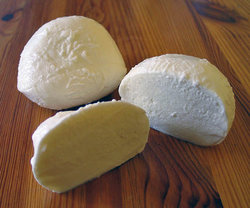Pasta filata
Pasta filata, an Italian term meaning literally ‘spun paste’, refers to a technique in the manufacture of a family of Italian cheeses also known in English as stretched-curd, pulled-curd, and plastic-curd cheeses.
The cheese-making begins in the normal way. The milk (usually from cows or water buffalo) is warmed and curdled and allowed to rest for an hour before the curds are cut into small pieces and the whey is drained off. The curds are allowed to rest for a number of hours.
Then follows the filatura. The curds are steeped for some hours in a bath of very hot whey, or water (for Mozzarella di Bufala Campana the temperature is 95°C). When they begin to float most of the liquid is removed and the curd is mixed and kneaded until the required soft, elastic, stringy texture is obtained. The mass of curd is divided (often by pulling out a thick strand and chopping it) and shaped into individual cheeses.
In the case of mozzarella or fior di latte the process is now essentially complete—ideally, indeed, these cheeses should be eaten within a matter of a few hours. For other formaggi a pasta filata, such as Provolone, Caciocavallo Silano and Scamorza, further processing is needed: ageing, always, and in some cases brining and/or smoking.
| Asiago · Basket · Bel Paese · Bocconcini · Bra · Brös · Burrata · Caciocavallo · Caciotta · Caprino · Casciotta d'Urbino · Castelrosso · Casu marzu · Crescenza · Crucolo · Dolcelatte · Fontina · Gorgonzola · Grana (Padano) · Liptauer · Mascarpone · Monte Veronese · Morlacco · Mozzarella (di Bufala Campana) · Parmigiano-Reggiano · Pasta filata · Pecorino (Romano, Sardo, Siciliano) · Piave · Provolone · Ricotta · Robiola · Romano · Scamorza · Sottocenere al tartufo · Stracchino · Stracciatella di Bufala · Taleggio · Toma |
